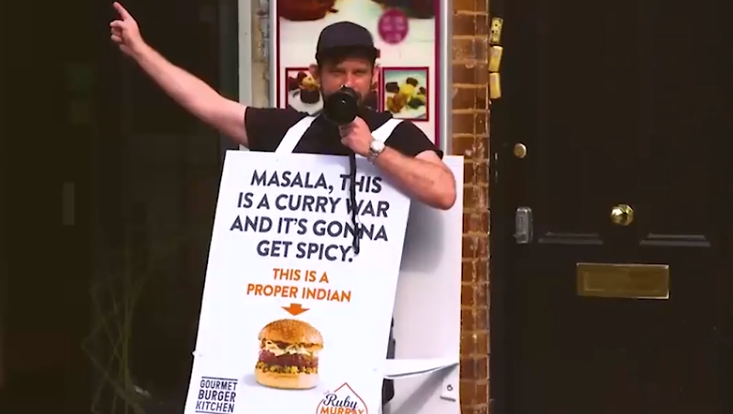What GBK's burger advert can teach us about colonialism and cultural appropriation
Yesterday, Gourmet Burger Kitchen released a new advert, in which they declared a ‘curry war’ on Indian restaurants.
In their video, a representative from GBK (a belligerent white guy wearing a big, promotional sandwich board), harasses customers entering local curry houses. He shouts into a megaphone that the new Ruby Murray burger is ‘a real Indian’, while Asian restaurants are serving ‘curry lies’.
It’s not clear whether the restaurant workers, one of whom is heard refusing to let the ragingly offensive GBK rep use the curry house’s bathroom, are in on the setup.
Whether or not these scenes really happened, the ad campaign leaves a sour taste. It was widely criticised online, with one Twitter user writing: “Probably want to take this one down guys [,] nobody wants to buy anything from a company that is harassing and attempting to take business away from small business owners. Issue some apologies to those businesses, and try another direction in advertising.” GBK have now apologised and removed the video.
On the one hand, I was pleased that the advert was taken down. I agreed with the critics: it does encourage the mistreatment of immigrant and non-white workers. And no, it’s not charmingly and hilariously postmodern, as GBK tried to imply when they wrote, “The campaign to launch our latest burger was intended to be humorous. We know that a GBK burger could never truly pass off as an authentic Indian dish.”
But, I must admit, part of me was disappointed that the advert was removed. Not because I thought it had a single amusing element or morally redeeming quality, but because it’s the perfect example of why we need to be having conversations about the ways in which the food industry relates to racial politics.
Usually, when people of colour accuse food corporations or famous chefs of appropriating their culture, their criticism is met with utter derision. Anyone who has the audacity to feel offended by something as harmless as a dish is told that they should have bigger fish to fry (or larger curries to cook). More often than not, people who try to start a conversation about cultural appropriation within the food industry are promptly given a pompous lecture on the necessary cultural fluidity of the culinary scene.
But this GBK advert, unpalatable as it may be, is incredibly useful in the sense that it clearly shows us why these conversations are necessary. It’s like an inadvertent public awareness campaign. Unlike other companies who may use careful advertising to disguise their intentions, GBK’s campaign stinks of a colonialist mentality. The advert is a perfect illustration of why the appropriation and bastardisation of a minority culture’s cuisine can curtail their economic prospects a country like Britain.
It feels utterly innocuous to experiment with foreign dishes, to turn Japanese sushi into an American burger, or to put some Indian spices into a Sunday roast. And, often, this sort of thing is harmless, (apart from in the case of dangerously nauseating concoctions like my infamous sweet and sour spaghetti).
But the GBK ad unintentionally shows us how creations like the Ruby Murray burger can cause real, palpable harm to a minority group. Because even if you don’t stand outside a local business, shouting abuse and deterring trade; if you steal and sell something that was created by another culture, you may as well be caterwauling outside a curry house. Your profit is their loss.
This dynamic becomes sinister within the context of a colonial legacy. Cultural fusion is complicated by ethnic inequality, and British businesses should err on the side of caution when it comes to using the creations of a previously colonised country for their own personal gain.
Cultural appropriation in the culinary world is not a straightforward issue. But, thanks to this GBK advert, we’ve been reminded that it certainly isn’t a ‘non-issue’. It’s something that we should be talking about.

 Yahoo News
Yahoo News 

